Published Jan 31, 2023
On Deep Space Nine, Bashir and O’Brien Fought Nazis — and Toxic Masculinity
The evolution of their friendship normalizes healthy, loving bonds between men.
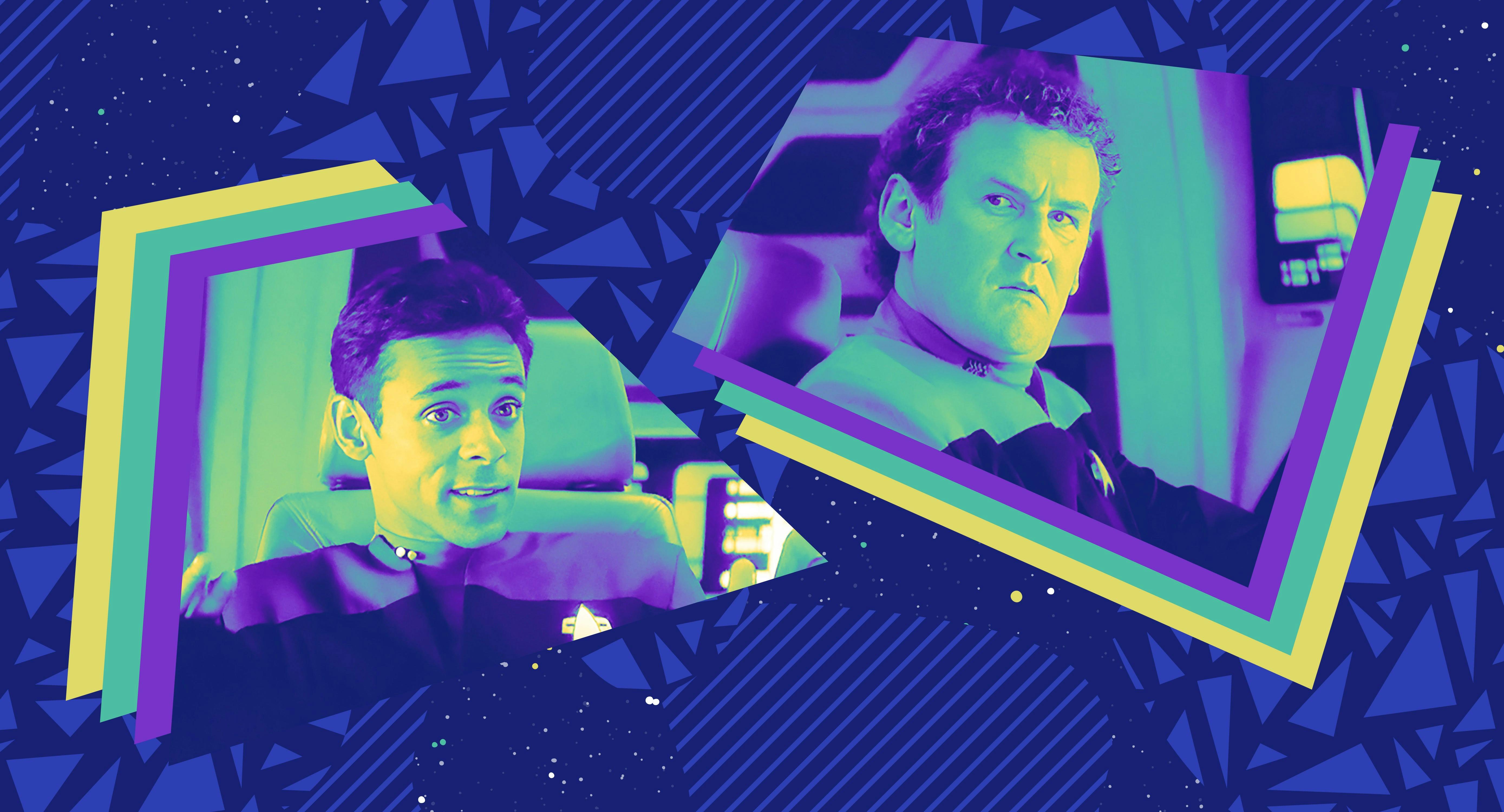
StarTrek.com
Engineering Chief Miles O’Brien and Dr. Julian Bashir make an unlikely duo — one seems like an arrogant womanizer obsessed with being the best at everything (including racquetball), while the other more closely resembles a blue-collar worker and family man.
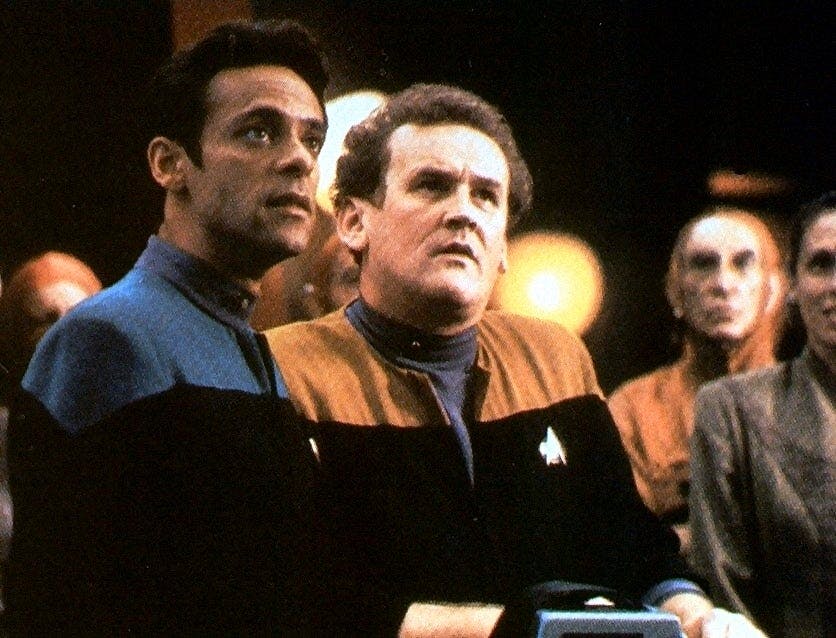
StarTrek.com
Only Star Trek: Deep Space Nine — a weigh station for misfits and the misunderstood — could bring them together. And so, in a turn of events just as surprising as a wormhole populated by spiritual beings, the pair become both playful frenemies and inseparable brothers-in-arms during their seven-year tenure on the station. Under the circumstances (isolated and with the threat of war constantly looming), the men develop an exceptionally healthy friendship.
Yet, looking back, their friendship also seems extraordinary; Deep Space Nine offered one of the few portrayals (both in the '90s and even now) of a relationship between two men that actively rebukes the pitfalls of "toxic masculinity" (a version of male behavior that prioritizes aggression, violence, and misogyny). In our current cultural moment, toxic masculinity has led to acts of extreme violence, and so it is perhaps more urgent than ever to revisit relationships which instead prioritize vulnerability and emotional connection. Men, who too often choose to bottle up, obfuscate, and ignore their most intense emotions, with sometimes tragic consequences, can learn so much from these two — especially how to process and express feelings that society incorrectly tries to label as weak or pathetic.
Episode Preview: Armageddon Game
Midway through the show’s second season, beginning with the episode "Armageddon Game," which aired on this date nearly three decades ago, Bashir and O’Brien become a central branch of the self-made family of soldiers and scientists that populate the station. While being hunted by a squad of aliens who want them dead (a normal day in the Star Trek world), the pair bond over frank discussions of love, addressing both O’Brien’s marriage and a woman Bashir once cared for, but whom he left to pursue a career in Starfleet. It’s a tender, surprisingly vulnerable conversation, and it launches them into full-blown friendship.
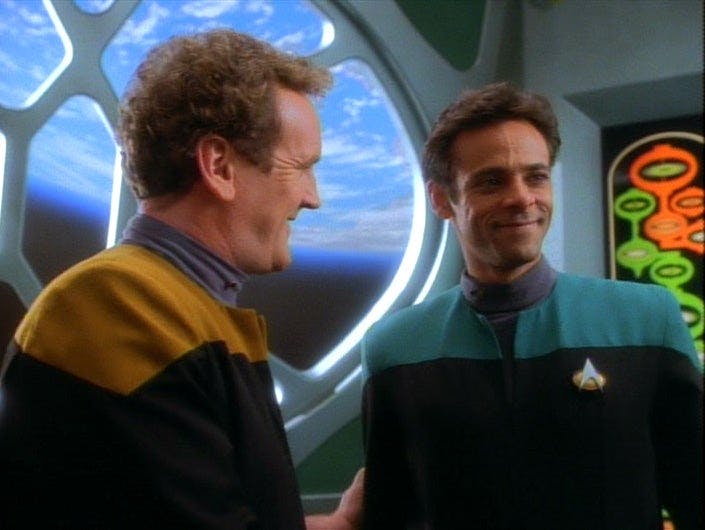
StarTrek.com
From then on, Bashir and O’Brien begin to develop a wildly convincing chemistry. The pair spend their evenings playing darts in Quark’s, or defeating Nazis as World War II fighter pilots in the Holodeck, and once, Bashir even helps O'Brien clean up his quarters before Keiko returns from Bajor. They argue, disagree, challenge each other, but are unconditionally supportive.
Take the moment O’Brien finds out Bashir’s parents illegally genetically modified him as a child. Tempers flare momentarily before Bashir confesses that he often felt like a disappointment to his parents. The doctor considers resigning to save himself the embarrassment of being discharged from Starfleet, while O’Brien reminds him that “genetic coding can’t give you ambition...or compassion.” Later, O’Brien relieves the latent tension over the incident by insisting that his friend stand farther back when they play darts.
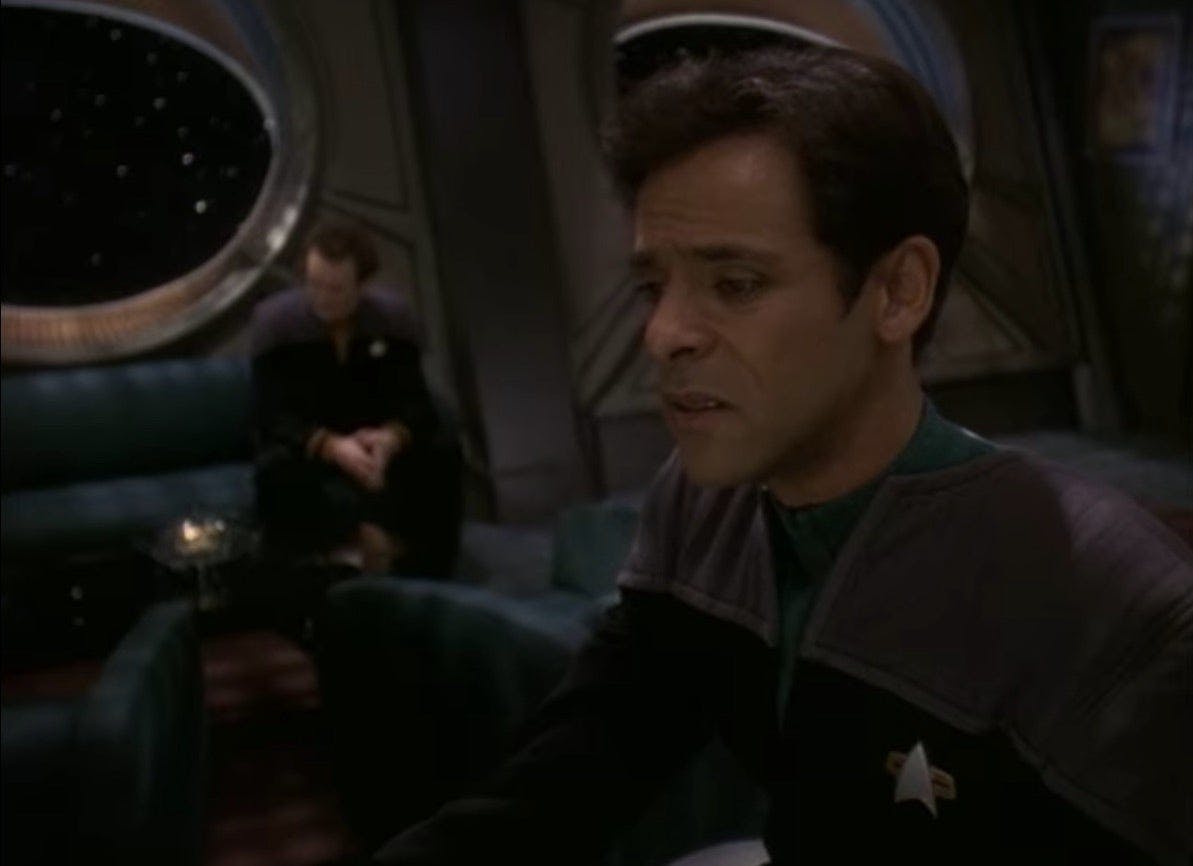
StarTrek.com
Dr. Bashir is equally as a present for his friend in times of crisis. After O’Brien’s memory is altered to make him believe he spent 20 years in prison in “Hard Time,”Bashir acknowledges his mental anguish, encourages him to seek counseling, and prevents him from committing suicide. Between the two of them, discussing mental health is always on the table, and acting with compassion, empathy, and kindness is the norm. This is a friendship based on not just mutual respect, but also platonic love.
At the beginning of “Hippocratic Oath,” O’Brien lets slip that he wishes his wife were a little more like Bashir. Other times that love is simply implied; in "Explorers," O’Brien admits that although he once hated Bashir, “Now I don’t... I really don’t hate you anymore.” That’s as close as the two ever get to saying “I love you,” but it’s close enough.
There are other moments of self-consciousness. In “Accession,”Keiko has to clandestinely facilitate a reunion between the pair after O’Brien insists on staying home with his unexpectedly pregnant wife. Soon, it becomes clear that they’re both lonely but can’t admit it to each other. Still, for the most part, they avoid violence or cruelty to assert their manliness. They have very little to prove to each other (off the racquetball court, at least), and therefore have the freedom to talk through fears and insecurities rather than masking them with aggression.
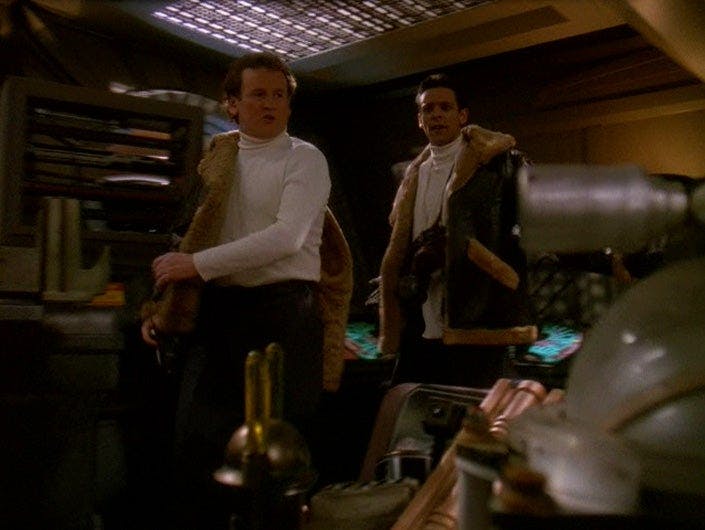
StarTrek.com
In this way, the friendship between O’Brien and Bashir is a blueprint for how to resist toxic masculinity. Being open about how you feel with another person is genuinely scary, but also essential. In a truly healthy relationship between any two people, fear is not an emotion to be ashamed of, or to hide. Neither is anger or sadness or love. O’Brien and Bashir’s friendship echoes a powerful sentiment expressed by Deanna Troi on Star Trek: The Next Generation after Data loses his temper for the first time and asks the counselor for guidance.
“Feelings aren’t positive and negative,” she tells him. “They simply exist. It’s what we do with those feelings that becomes good or bad.”
Bashir and O’Brien allow each other to feel the full depth of their emotions — the ugly, painful, and joyful — sometimes even taking those emotions out on each other, but never allowing those feelings to become harmful actions.
Friendships between men are so often poisoned by competition, posturing, and emotional blockades which prevent them from fully seeing and understanding each other. To end that cycle, it’s crucial that men provide each other with a safe space in which they can talk about and process their emotions, without judgment, and hold each other accountable when their behavior veers into toxic territory. If more men followed O’Brien and Bashir’s model, their interactions with each other and the rest of the world would probably be so much more pleasant and fulfilling. Those two were never ashamed of loving each other. Not only does that make their friendship one that will always be worth revisiting, but also helps solidify Deep Space Nine’s status as a progressive show that hasn’t yet lost its poignancy and relevance.
This article was originally published on July 2, 2019.
Elisabeth Sherman (she/her) is a food and culture writer based in Jersey City. Follow her on Twitter at @shermanelis.
Stay tuned to StarTrek.com for more details! And be sure to follow @StarTrek on Facebook, Twitter, and Instagram.

